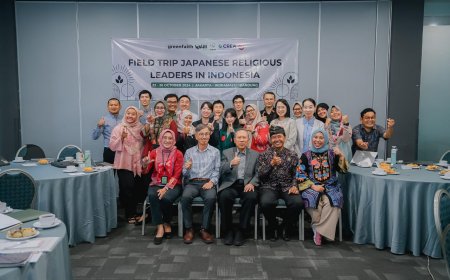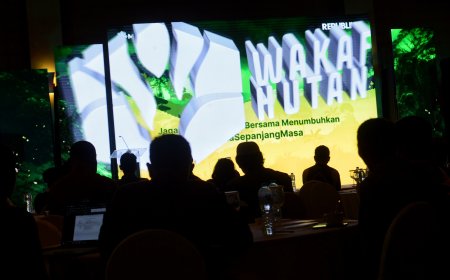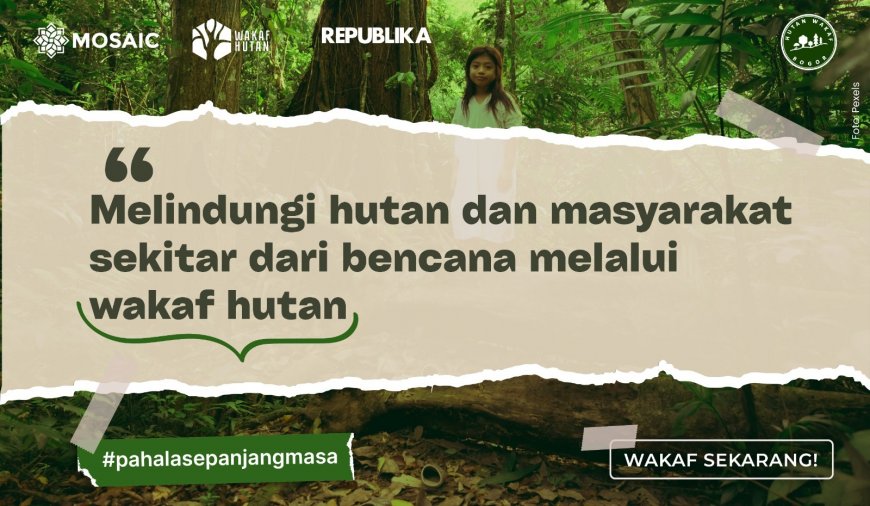Climate mission behind the Pesantren wall
This boarding is judged to fill ten ecopesantren indicators.
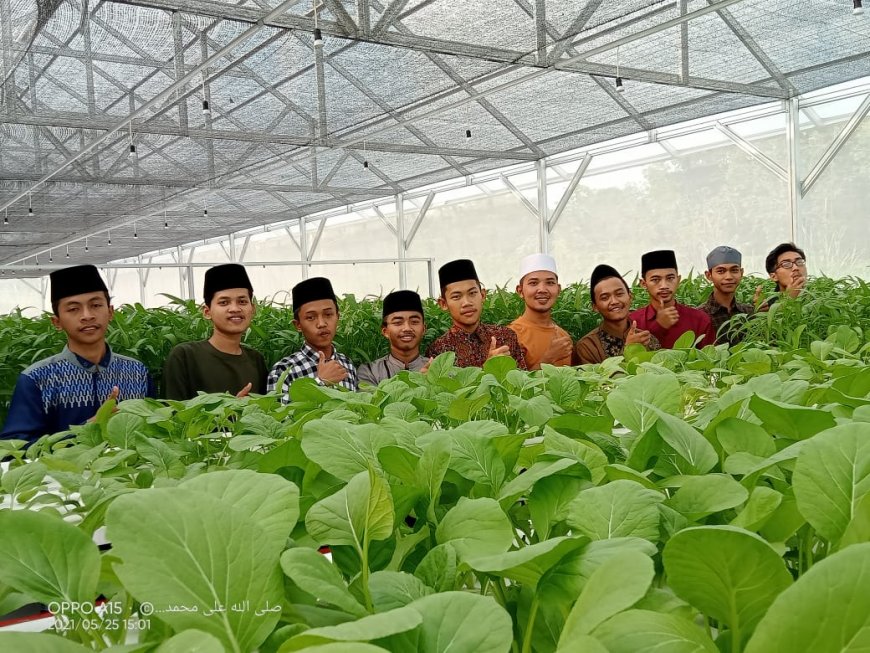
MOSAIC-INDONESIA, JAKARTA — Pesantren is an unique educational system for Muslims in Indonesia. At least, there are more than 35,000 pesantrens with more than three millions students spread across dozens of provinces. In the context of the climate movement, the role of these boarding schools is not small. One of them is the Sunan Pandanaran Pesantren which is located in Dusun Candi, Sleman, Yogyakarta Regency.
This boarding school, often called PPSPA, was established since December 20, 1975. PPSPA is one of the ecological boarding schools that received the award called the Ecopesantren Award 2024. PPSPA has filled ten ecopesentren indicators such as environmental policy, improvement of human resources, boarding school land, water resources, clean and healthy living, waste and waste, resources and energy, transport and biodiversity.
PPSPA caretaker Mohammad Rokhmat said that PPSPA has an environmentally friendly curriculum. One of them is concern for food security and environmental issues. Some of its values are taken from the Qur'an. First, humans are born as caliphs or leaders on earth (QS. Al-Baqarah: 30); Second, man was created in his best form (QS. At-Tin: 4); Third, man is endowed with reason (QS. Al-Baqarah: 219).
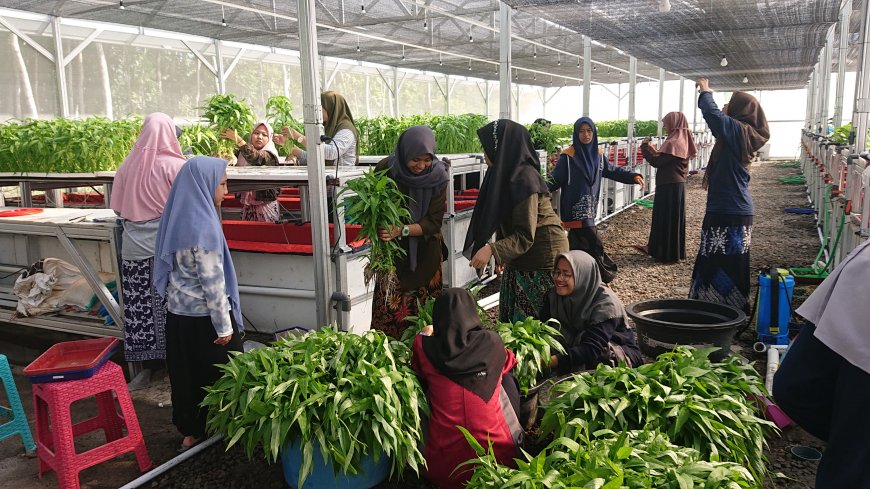
Based on the foundation of the Quran, Rokhmat said, it is believed that humans take care of the universe based on environmental principles, such as the balance between humanity, economic needs and the environment. This principle is applied through a variety of programs, for example, he said, the pesantren seeks to open a boarding school business unit with an environmental base such as the Aquaponic Greenhouse (two functions in one aspect, namely, positioning fish and organic vegetables). Then Bustan Nursery (one of the business units of seeding fruit crops, protective trees, water absorbing trees, ornamental plants, orchids, bonsai etc).
The next principle is ta'addud/diversity when humans appreciate biodiversity and the environment. “The boarding house has a place for the conservation of flora and fauna, such as bird conservation in a large aviary enclosure, is farmed and if the time comes, the birds will be released into the wild,” Rokhmat told the editorial board of MOSAIC.
There is also the principle of tarbiyah or education by which humans learn and raise awareness of the importance of maintaining the environment. This value is applied to boarding schools with the presence of caderization patterns, tree planting programs, natural ecosystems and others so that santri forms awareness of the environment and has a positive impact on nature.
He said the boarding school also has a reduce, reuse and recycle (3R) program for waste management. The program involves the kindergarten and the boarding school administrator by sorting the garbage (if the garbage is still mixed). Organic waste such as food scraps is used as feed for poultry and fish. Junk bottles, iron, cardboard will be separated by themselves for later sale. While residual waste that has no economic value will be destroyed by incineration. “The sorting of such garbage, generates economic value,” he said,
According to Rokhmat, those programs prove that pesantren have a role in the maintenance of the environment. He said that pesantren can give influence for the society because within the boarding school there is a leader (Kiai or ulama) who is honoured by its neighbourhood. In addition, the boarding school has a system in accordance with the Law on Pesantren No.18 of 2019, that pesantren has three functions, namely the education function, missionary (daqwah), and the community service function.
From those systems, he explains, pesantren through their clerics have an important role and influence for voicing concern about climate change, and determining policy directions forward. It is on the basis of religion, he said, that governs the relationship between man and God, man with his fellow man and man with his universe.
In addition, the system (curriculum) in boarding schools related to caring for the environment, has an impact on the harmony and balance of the environment. In addition, it also educates generations who care about the environment.
Boarding school background
Pondok Pesantren Sunan Pandanaran (PPSPA) was founded by K. H. Mufid Mas'ud with his wife named Ibunyai Hj. Jauharoh who is the daughter of the founder of Pondok Pesantren al-Munawwir Krapyak Yogyakarta, K.H. Munawwir. PPSPA was established on 17 Dzulhijjah 1395 H., which coincided with December 20, 1975 A.D.
The pesantren, in addition to being intended as a medium of daqwah, initially concentrated in the field of the Qur'an, especially the tahfidh of the Qur'an. This is in view of KH. Mufid is an expert and has the ability to manifest in the field of Qur'anic tahidh.
Therefore, PPSPA divides the levels of mortality into three levels. First, the death of juz 'amma (memorized Juz 30). Second, khataman bi al-nadhar (khatam Juz 30, Surat al-Kahfi, Surat Yaasin and Short Surahs) and third, the top level is khataman bi al-ghaib (memorized from Juz 1 to Juz 30).
For the education system, PPSPA follows the Ministry of Religious Affairs with a madrasah scheme. PPSPA students sit from raudhatul athfal (RA) level, ibtidaiyah madrasah (MI), tsanawiyah madrasah at junior high school level and Aliyah madrasah which is high school level.


